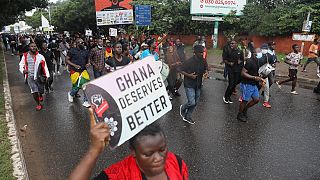Business Africa
Ghana has had to run to the IMF 17 times since independence - that’s roughly once every four years on average.
This time though, securing a bailout package from the multilateral lender was the easier part.
There's still a ton of work for Ghana's leaders to do to convince creditors to provide over $22 billion in debt relief- not least because a significant portion of Accra's external debt is held by private lenders who want all their money back.
76% of Ghana's external debt is held by commercial lenders including bondholders. Multilateral development banks also hold a significant portion of Ghana's debt, followed by the Paris Club and China.
Ghana is also in default which makes reaching an agreement on debt relief even harder, with bondholders especially hesitant to give any concessions, not to mention the geopoliticization of debt.
Professor Theophilus Acheampong is an economist and a visiting Senior Fellow at the Africa Policy Research Institute.
He joins the show with insights on the complex debt restructuring negotiations between Accra and its creditors.
Zimbabwe dollarization
Since 2009, Zimbabwe has adopted a range of currencies including the US dollar in a bid to tackle inflation and economic collapse. In 2019, Harare reverted to a local currency (RTGS) which is now being haunted by inflation and high interest rates.
Manufacturers, retailers and suppliers all prefer to settle in the US dollar with only a small fraction of transactions being completed in the local currency.
Africa's top CEOs back AfCFTA
The African Continental Free Trade Area was conceived as a mechanism to increase intra-African trade.
But to fully unlock the bloc's potential, key business leaders, investors and policy makers meeting in Abidjan say local manufacturing has to tick up dramatically.
Agro-processing has been identified as one of the most viable sectors.













Go to video
World Bank grants South Africa $1.5B for infrastructure, green energy
01:46
Poverty drives instability, conflict - UN chief
Go to video
Second round: Ramaphosa faces Trump again after Oval Office fallout
01:03
Ethiopia to post faster growth despite debt, inflation
Go to video
World Bank resumes Uganda loans after anti-gay law freeze
Go to video
Nigeria completes $3.4 Billion IMF COVID-19 loan repayment, faces ongoing annual charges